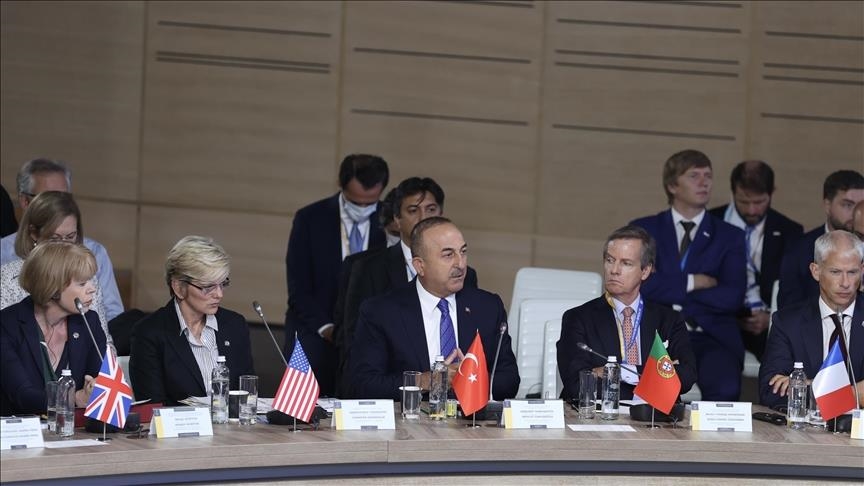Turkey calls for diplomacy to resolve Crimea issue
Crimea Platform Summit marks important start to coordinate efforts to achieve lasting solution, says top Turkish diplomat

ANKARA
More than 40 foreign delegations, including the ones led by the Polish, Latvian and Estonian presidents and the head of the European Council, gathered on Monday in Ukraine’s capital Kyiv for the Crimea Platform Summit.
Speaking at the event, Turkish Foreign Minister Mevlut Cavusoglu stressed the necessity of diplomacy to find a peaceful solution to the issue Crimea issue.
Russian forces entered the Crimean Peninsula on February 2014, with President Vladimir Putin formally dividing the region into two separate federal subjects of the Russian Federation the following month.
Turkey and the US, as well as the UN General Assembly, view the annexation as illegal, as does the EU, which imposed sanctions on Russia for the seizure.
"More than seven years pass since the illegal and illegitimate annexation of Crimea, our support to the territorial integrity of Ukraine is so strong," Cavusoglu said.
Stressing that there is "no easy solution" to the issue, he said the Crimea Platform Summit "marks an important start to coordinate our efforts to achieve a peaceful and lasting solution."
He called on the international community to speak "as one voice against this violation of international law. We believe that the Crimea platform will serve as an effective forum to show our commitment and solidarity."
The Turkish minister criticized the lack of effectiveness of international organization, saying: "Unfortunately the international organizations, including the UN mechanism, is not well designed to resolve (the issue)."
"This platform should serve as an avenue to raise global awareness about Crimea. To propose inter-parliamentary contacts, effective public messaging and expert-level meetings, especially on international law, will add value to this work," he added.
Cavusoglu said the Crimean issue is not only about a territory but also about people.
"I know large Tatar communities live in your respective countries. Turkey is also home to millions of citizens of Tatar origin. The great Tatar intellectual, Ismail Gaspirali, once said, 'it is easy to fall, but difficult to stand up again'. The Tatars have managed to get back up after all hardships throughout history," the top Turkish diplomat said.
Born in on March 20, 1851 in Avcikoy village near Bakhchysarai town in central Crimea, Gaspirali is one of the pioneers of the unity of Turkic world and left a mark with his works in print media and education.
Turkey, Ukraine enhancing ties
Cavusoglu also applauded Ukrainian President Volodymyr Zelensky as well as Ukrainian parliament for "recognizing the Crimean Tatars as indigenous people" of the country.
Prior to the summit, Turkish foreign minister also spoke to group of reporters and said his country have never recognized "the illegal annexation of Crimea and we constantly emphasize that we will not."
He went on to say that Turkey and Ukraine work closely to further enhance relations in various fields.
"I will once again come to Ukraine in October to hold the Joint Strategic Planning Meeting with my dear friend Dmytro Kuleba," he said, referring to his Ukrainian counterpart.
Meanwhile, the Ukrainian president in his opening remarks vowed to "restore" Crimea.
Zelensky called for an "international support" and said his country needs "joint efforts" to end the "aggression on temporarily occupied Crimean lands."
Stressing that a "new page in history" needs to be written, he also announced that a joint declaration will be signed at the summit.
"We need to think of sanctions, human rights consequences, economic and environmental consequences of the occupation," he added.
The Crimea Platform is a diplomatic initiative of Ukraine that is intended to be an international coordination mechanism to draw more global attention to Russia's illegal annexation of Crimea in 2014.
Protection of local Ukrainians and Crimean Tatars and their religious heritage, prevention of further human rights violations, freedom of international navigation in the Black Sea and Azov Sea, and Russia's militarization of the peninsula are among the topics on the summit agenda.








